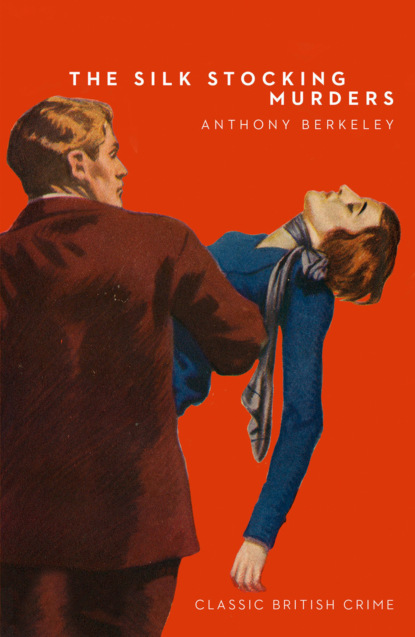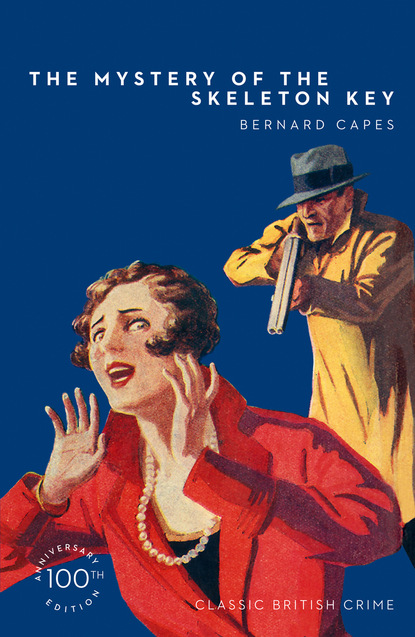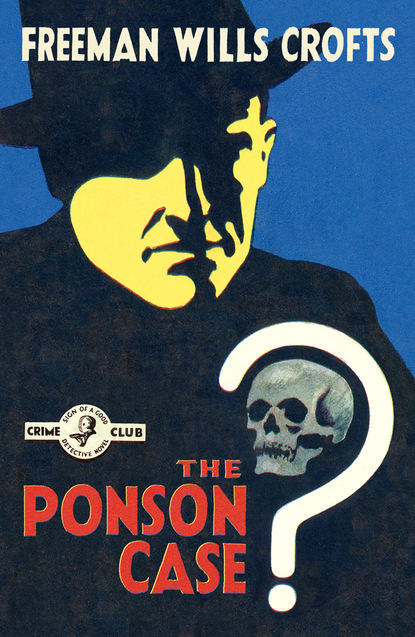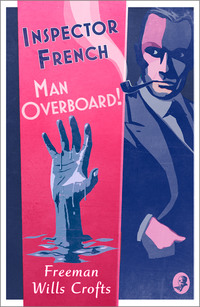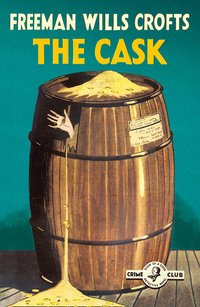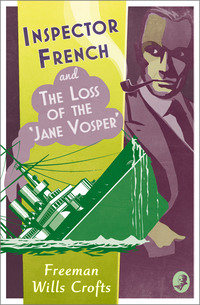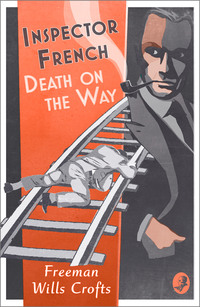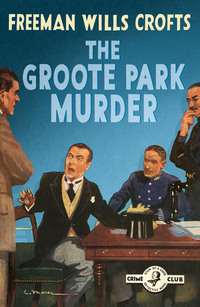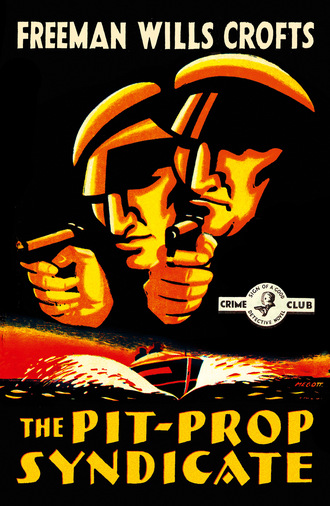
Полная версия
The Pit-Prop Syndicate
He apologised in some confusion. It was the unexpectedness of meeting a fellow-countryman in this out of the way wood … It was … He did not mean …
‘You want to say my French is not really so bad after all?’ she said relentlessly, and then: ‘I can tell you it’s a lot better than when we came here.’
‘Then you are a newcomer?’
‘We’re not out very long. It’s rather a change from London, as you may imagine. But it’s not such a bad country as it looks. At first I thought it would be dreadful, but I have grown to like it.’
She had turned with him, and they were now walking together between the tall, straight stems of the trees.
‘I’m a Londoner,’ said Merriman slowly. ‘I wonder if we have any mutual acquaintances?’
‘It’s hardly likely. Since my mother died some years ago we have lived very quietly, and gone out very little.’
Merriman did not wish to appear inquisitive. He made a suitable reply and, turning the conversation to the country, told her of his day’s ride. She listened eagerly, and it was borne in upon him that she was lonely, and delighted to have any one to talk to. She certainly seemed a charming girl, simple, natural and friendly, and obviously a lady.
But soon their walk came to an end. Some quarter of a mile from the wood the lane debouched into a large, D-shaped clearing. It had evidently been recently made, for the tops of many of the tree-stumps dotted thickly over the ground were still white. Round the semicircle of the forest trees were lying cut, some with their branches still intact, others stripped clear to long, straight poles. Two small gangs of men were at work, one felling, the other lopping.
Across the clearing, forming its other boundary and the straight side of the D, ran a river, apparently from its direction that which Merriman had looked down from the road bridge. It was wider here, a fine stretch of water, though still dark coloured and uninviting from the shadow of the trees. On its bank, forming a centre to the cleared semicircle, was a building, evidently the mill. It was a small place, consisting of a single long, narrow galvanised iron shed, placed parallel to the river. In front of the shed was a tiny wharf, and behind it were stacks and stacks of tree trunks, cut in short lengths and built as if for seasoning. Decauville tramways radiated from the shed, and men were running in timber in the trucks. From the mill came the hard, biting screech of a circular saw.
‘A sawmill!’ Merriman exclaimed rather unnecessarily.
‘Yes. We cut pit-props for the English coal mines. Those are they you see stacked up. As soon as they are drier they will be shipped across. My father joined with some others in putting up the capital, and—voilà!’ She indicated the clearing and its contents with a comprehensive sweep of her hand.
‘By Jove! A jolly fine notion too, I should say. You have everything handy—trees handy, river handy—I suppose from the look of that wharf that sea-going ships can come up?’
‘Shallow draughted ones only. But we have our own motor ship specially built and always running. It makes the round trip in about ten days.’
‘By Jove!’ Merriman said again. ‘Splendid! And is that where you live?’
He pointed to a house standing on a little hillock near the edge of the clearing at the far, or down-stream side of the mill. It was a rough, but not uncomfortable looking building of galvanised iron, one storied and with a piazza in front. From a brick chimney a thin spiral of blue smoke was floating up lazily into the calm air.
The girl nodded.
‘It’s not palatial, but it’s really wonderfully comfortable,’ she explained, ‘and oh, the fires! I’ve never seen such glorious wood fires as we have. Cuttings, you know. We have more blocks than we know what to do with.’
‘I can imagine. I wish we had ’em in London.’
They were walking not too rapidly across the clearing towards the mill. At the back of the shed were a number of doors, and opposite one of them, heading into the opening, stood the motor lorry. The engine was still running, but the driver had disappeared, apparently into the building. As the two came up, Merriman once more ran his eye idly over the vehicle. And then he felt a sudden mild surprise, as one feels when some unexpected though quite trivial incident takes place. He had felt sure that this lorry standing at the mill door was that which had passed him on the bridge, and which he had followed down the lane. But now he saw that it wasn’t. He had noted, idly but quite distinctly, that the original machine was No. 4. This one had a precisely similar plate, but it bore the legend ‘The Landes Pit-Prop Syndicate, No. 3.’
Though the matter was of no importance, Merriman was a little intrigued, and he looked more closely at the vehicle. As he did so his surprise grew and his trifling interest became mystification. The lorry was the same. At least there on the top was the casting, just as he had seen it. It was inconceivable that two similar lorries should have two identical castings, arranged in the same way, and at the same time and place. And yet, perhaps it was just possible.
But as he looked he noticed a detail which settled the matter. The casting was steadied by some rough billets of wood. One of these billets was split, and a splinter of curious shape had partially entered a bolt hole. He recalled now, though it had slipped from his memory, that he had noticed that queer shaped splinter as the lorry passed him on the bridge. It was therefore unquestionably and beyond a shadow of doubt the same machine.
Involuntarily he stopped and stood staring at the number plate, wondering if his recollection of that seen at the bridge could be at fault. He thought not. In fact, he was certain. He recalled the shape of the 4, which had an unusually small hollow in the middle. There was no shadow of doubt of this either. He remained motionless for a few seconds, puzzling over the problem and was just about to remark on it when the girl broke in hurriedly.
‘Father will be in the office,’ she said, and her voice was sharpened as from anxiety. ‘Won’t you come and see him about the petrol?’
He looked at her curiously. The smile had gone from her lips, and her face was pale. She was frowning, and in her eyes there showed unmistakable fear. She was not looking at him, and his gaze followed the direction of hers.
The driver had come out of the shed, the same dark, aquiline featured man as had passed him on the bridge. He had stopped and was staring at Merriman with an intense regard in which doubt and suspicion rapidly changed to hostility. For the moment neither man moved, and then once again the girl’s voice broke in.
‘Oh, there is father,’ she cried, with barely disguised relief in her tones. ‘Come, won’t you, and speak to him.’
The interruption broke the spell. The driver averted his eyes and stooped over his engine; Merriman turned towards the girl, and the little incident was over.
It was evident to Merriman that he had in some way put his foot in it, how he could not imagine, unless there was really something in the matter of the number plate. But it was equally clear to him that his companion wished to ignore the affair, and he therefore expelled it from his mind for the moment, and, once again following the direction of her gaze, moved towards a man who was approaching from the far end of the shed.
He was tall and slender like his daughter, and walked with lithe, slightly feline movements. His face was oval, clear skinned, and with a pallid complexion made still paler by his dark hair and eyes and a tiny moustache, almost black and with waxed and pointed ends. He was good-looking as to features, but the face was weak and the expression a trifle shifty.
His daughter greeted him, still with some perturbation in her manner.
‘We were just looking for you, daddy,’ she called a little breathlessly. ‘This gentleman is cycling to Bordeaux and has run out of petrol. He asked me if there was any to be had hereabouts, so I told him you could give him some.’
The newcomer honoured Merriman with a rapid though searching and suspicious glance, but he replied politely, and in a cultured voice:
‘Quite right, my dear.’ He turned to Merriman and spoke in French. ‘I shall be very pleased to supply you, monsieur. How much do you want?’
‘Thanks awfully, sir,’ Merriman answered in his own language. ‘I’m English. It’s very good of you, I’m sure, and I’m sorry to be giving so much trouble. A litre should run me to Bordeaux, or say a little more in case of accidents.’
‘I’ll give you two litres. It’s no trouble at all.’ He turned and spoke in rapid French to the driver.
‘Oui, monsieur,’ the man replied, and then, stepping up to his chief, he said something in a low voice. The other started slightly, for a moment looked concerned, then instantly recovering himself, advanced to Merriman.
‘Henri, here, will send a man with a two litre can to where you left your machine,’ he said, then continued with a suave smile:
‘And so, sir, you’re English? It is not often that we have the pleasure of meeting a fellow-countryman in these wilds.’
‘I suppose not, sir, but I can assure you your pleasure and surprise is as nothing to mine. You are not only a fellow-countryman but a friend in need as well.’
‘My dear sir, I know what it is to run out of spirit. And I suppose there is no place in the whole of France where you might go farther without finding any than this very district. You are on pleasure bent, I presume?’
Merriman shook his head.
‘Unfortunately, no,’ he replied. ‘I’m travelling for my firm, Edwards & Merriman, Wine Merchants of London. I’m Merriman, Seymour Merriman, and I’m going round the exporters with whom we deal.’
‘A pleasant way to do it, Mr Merriman. My name is Coburn, You see, I am trying to change the face of the country here?’
‘Yes, Miss’—Merriman hesitated for a moment and looked at the girl—‘Miss Coburn told me what you were doing. A splendid notion, I think.’
‘Yes, I think we’re going to make it pay very well. I suppose you’re not making a long stay?’
‘Two days in Bordeaux, sir, then I’m off east to Avignon.’
‘Do you know, I rather envy you. One gets tired of these tree trunks and the noise of the saws. Ah, there is your petrol.’ A workman had appeared with a red can of Shell. ‘Well, Mr Merriman, a pleasant journey to you. You will excuse my not going farther with you, but I am really supposed to be busy.’ He turned to his daughter with a smile. ‘You, Madeleine, can see Mr Merriman to the road?’
He shook hands, declined Merriman’s request to be allowed to pay for the petrol and, cutting short the other’s thanks with a wave of his arm, turned back to the shed.
The two young people strolled slowly back across the clearing, the girl evidently disposed to make the most of the unwonted companionship, and Merriman no less ready to prolong so delightful an interview. But in spite of the pleasure of their conversation, he could not banish from his mind the little incident which had taken place, and he determined to ask a discreet question or two about it.
‘I say,’ he said, during a pause in their talk, ‘I’m afraid I upset your lorry man somehow. Did you notice the way he looked at me?’
The girl’s manner, which up to this had been easy and careless, changed suddenly, becoming constrained and a trifle self-conscious. But she answered readily enough.
‘Yes, I saw it. But you must not mind Henri. He was badly shell-shocked, you know, and he has never been the same since.’
‘Oh, I’m sorry,’ Merriman apologised, wondering if the man could be a relative. ‘Both my brothers were hit the same way. They were pretty bad, but they’re coming all right. It’s generally a question of time, I think.’
‘I hope so,’ Miss Coburn rejoined, and quietly but decisively changed the subject.
They began to compare notes about London, and Merriman was sorry when, having filled his tank and pushed his bicycle to the road, he could no longer with decency find an excuse for remaining in her company. He bade her a regretful farewell, and some half-hour later was mounting the steps of his hotel in Bordeaux.
That evening, and many times later, his mind reverted to the incident of the lorry. At the time she made it, Miss Coburn’s statement about the shell-shock had seemed entirely to account for the action of Henri, the driver. But now Merriman was not so sure. The more he thought over the affair, the more certain he felt that he had not made a mistake about the number plate, and the more likely it appeared that the driver had guessed what he, Merriman, had noticed, and resented it. It seemed to him that there was here some secret which the man was afraid might become known, and Merriman could not but admit to himself that all Miss Coburn’s actions were consistent with the hypothesis that she also shared that secret and that fear.
And yet the idea was grotesque that there could be anything serious in the altering of the number plate of a motor lorry, assuming that he was not mistaken. Even if the thing had been done, it was a trivial matter and, so far as he could see, the motives for it, as well as its consequences, must be trivial. It was intriguing, but no one could imagine it to be important. As Merriman cycled eastward through France his interest in the affair gradually waned, and when, a fortnight later, he reached England, he had ceased to give it a serious thought.
But the image of Miss Coburn did not so quickly vanish from his imagination, and many times he regretted he had not taken an opportunity of returning to the mill to renew the acquaintanceship so unexpectedly begun.
CHAPTER II
AN INTERESTING SUGGESTION
ABOUT ten o’clock on a fine evening towards the end of June, some six weeks after the incident described in the last chapter, Merriman formed one of a group of young men seated round the open window of the smoking room in the Rovers’ Club in Cranbourne Street. They had dined together, and were enjoying a slack hour and a little desultory conversation before moving on, some to catch trains to the suburbs, some to their chambers in town, and others to round off the evening with some livelier form of amusement. The Rovers had premises on the fourth floor of a large building near the Hippodrome. Its membership consisted principally of business and professional men, but there was also a sprinkling of members of Parliament, political secretaries and minor government officials, who, though its position was not ideal, were attracted to it because of the moderation of its subscription and the excellence of its cuisine.
The evening was calm, and the sounds from the street below seemed to float up lazily to the little group in the open window, as the smoke of their pipes and cigars floated up lazily towards the ceiling above. The gentle hum of the traffic made a pleasant accompaniment to their conversation, as the holding down of a soft pedal fills in and supports dreamy organ music. But for the six young men in the bow window the room was untenanted, save for a waiter who had just brought some fresh drinks, and who was now clearing away empty glasses from an adjoining table.
The talk had turned on foreign travel, and more than one member had related experiences which he had undergone while abroad. Merriman was tired and had been rather silent, but it was suddenly borne in on him that it was his duty, as one of the hosts of the evening, to contribute somewhat more fully towards the conversation. He determined to relate his little adventure at the saw-mill of the Pit-Prop Syndicate. He therefore lit a fresh cigar, settled himself more comfortably in his chair, and began to speak.
‘Any of you fellows know the country just south of Bordeaux?’ he asked, and, as no one responded, he went on: ‘I know it a bit, for I have to go through it every year on my trip round the wine exporters. This year a rather queer thing happened when I was about half an hour’s run from Bordeaux; absolutely a trivial thing and of no importance, you understand, but it puzzled me. Maybe some of you could throw some light on it?’
‘Proceed, my dear sir, with your trivial narrative,’ invited Jelfs, a man sitting at one end of the group. ‘We shall give it the weighty consideration which it doubtless deserves.’
Jelfs was a stockbroker and the professional wit of the party. He was a good soul, but boring. Merriman took no notice of the interruption.
‘It was between five and six in the evening,’ he went on, and he told in some detail of his day’s run, culminating in his visit to the sawmill and his discovery of the alteration in the number of the lorry. He gave the facts exactly as they had occurred, with the single exception that he made no mention of his meeting with Madeleine Coburn.
‘And what happened?’ asked Drake, another of the men, when he had finished.
‘Nothing more happened,’ Merriman returned. ‘The manager came and gave me some petrol, and I cleared out. The point is, why should that number plate have been changed?’
Jelfs fixed his eyes on the speaker, and gave the little sidelong nod which indicated to the others that another joke was about to be perpetrated.
‘You say,’ he asked impressively, ‘that the lorry was at first 4 and then 3. Are you sure you haven’t made a mistake of 41?’
‘How do you mean?’
‘I mean that it’s a common enough phenomenon for a No. 4 lorry to change, after lunch, let us say, into No. 44. Are you sure it wasn’t 44?’
Merriman joined in the laugh against him.
‘It wasn’t forty-anything, you old blighter,’ he said good-humouredly. ‘It was 4 on the road, and 3 at the mill, and I’m as sure of it as that you’re an amiable imbecile.’
‘Inconclusive,’ murmured Jelfs, ‘entirely inconclusive. But,’ he persisted, ‘you must not hold back material evidence. You haven’t told us yet what you had at lunch.’
‘Oh, stow it, Jelfs,’ said Hilliard, a thin-faced, eager looking young man who had not yet spoken. ‘Have you no theory yourself, Merriman?’
‘None. I was completely puzzled. I would have mentioned it before only it seemed to be making a mountain out of nothing.’
‘I think Jelf’s question should be answered, you know,’ Drake said critically, and after some more good-natured chaff the subject dropped.
Shortly after one of the men had to leave to catch his train, and the party broke up. As they left the building Merriman found Hilliard at his elbow.
‘Are you walking?’ the latter queried. ‘If so I’ll come along.’
Claud Hilliard was the son of a clergyman in the Midlands, a keen, not to say brilliant student who had passed through both school and college with distinction, and was already at the age of eight-and-twenty making a name for himself on the headquarters staff of the Customs Department. His thin, eager face, with its hooked nose, pale blue eyes and light, rather untidy looking hair, formed a true index of his nimble, somewhat speculative mind. What he did, he did with his might. He was keenly interested in whatever he took up, showing a tendency, indeed, to ride his hobbies to death. He had a particular penchant for puzzles of all kinds, and many a knotty problem brought to him as a last court of appeal received a surprisingly rapid and complete solution. His detractors, while admitting his ingenuity and the almost uncanny rapidity with which he seized on the essential facts of a case, said he was lacking in staying power, but if this were so, he had not as yet shown signs of it.
He and Merriman had first met on business, when Hilliard was sent to the wine merchants on some matter of Customs. The acquaintanceship thus formed had ripened into a mild friendship, though the two had not seen a great deal of each other.
They passed up Coventry Street and across the Circus into Piccadilly. Hilliard had a flat in a side street off Knightsbridge, while Merriman lived farther west in Kensington. At the door of his flat Hilliard stopped.
‘Come in for a last drink, won’t you?’ he invited. ‘It’s ages since you’ve been here.’
Merriman agreed, and soon the two friends were seated at another open window in the small, but comfortable sitting-room of the flat.
They chatted for some time, and then Hilliard turned the conversation to the story Merriman had told in the club.
‘You know,’ he said, knocking the ash carefully off his cigar, ‘I was rather interested in that tale of yours. It’s quite an intriguing little mystery. I suppose it’s not possible that you could have made a mistake about those numbers?’
Merriman laughed.
‘I’m not exactly infallible, and I have, once or twice in my life, made mistakes. But I don’t think I made one this time. You see, the only question is the number at the bridge. The number at the mill is certain. My attention was drawn to it, and I looked at it too often for there to be the slightest doubt. It was No. 3 as certainly as that I’m alive. But the number at the bridge is different. There was nothing to draw my attention to it, and I only glanced at it casually. I would say that I was mistaken about it only for one thing. It was a black figure on a polished brass ground, and I particularly remarked that the black lines were very wide, leaving an unusually small brass triangle in the centre. If I noticed that, it must have been a 4.’
Hilliard nodded.
‘Pretty conclusive, I should say.’ He paused for a few moments, then moved a little irresolutely. ‘Don’t think me impertinent, old man,’ he went on with a sidelong glance, ‘but I imagined from your manner you were holding something back. Is there more in the story than you told?’
It was now Merriman’s turn to hesitate. Although Madeleine Coburn had been in his thoughts more or less continuously since he returned to town, he had never mentioned her name, and he was not sure that he wanted to now.
‘Sorry I spoke, old man,’ Hilliard went on. ‘Don’t mind answering.’
Merriman came to a decision.
‘Not at all,’ he answered slowly. ‘I’m a fool to make any mystery of it. I’ll tell you. There is a girl there, the manager’s daughter. I met her in the lane when I was following the lorry, and asked her about petrol. She was frightfully decent; came back with me and told her father what I wanted, and all that. But, Hilliard, here’s the point. She knew! There’s something, and she knows it too. She got quite scared when that driver fixed me with his eyes, and tried to get me away, and she was quite unmistakably relieved when the incident passed. Then later her father suggested she should see me to the road, and on the way I mentioned the thing—said I was afraid I had upset the driver somehow—and she got embarrassed at once, told me the man was shell-shocked, implying that he was queer, and switched off on to another subject so pointedly I had to let it go at that.’
Hilliard’s eyes glistened.
‘Quite a good little mystery,’ he said, ‘I suppose the man couldn’t have been a relation, or even her fiancé?’
‘That occurred to me, and it is possible. But I don’t think so. I believe she wanted to try to account for his manner, so as to prevent me smelling a rat.’
‘And did she not account for it?’
‘Perhaps she did, but again I don’t think so. I have a pretty good knowledge of shell-shock, as you know, and it didn’t look like it to me. I don’t suggest she wasn’t speaking the truth. I mean that this particular action didn’t seem to be so caused.’
There was silence for a moment and then Merriman continued:
‘There was another thing which might bear in the same direction, or again it may only be my imagination—I’m not sure of it. I told you the manager appeared just in the middle of the little scene, but I forgot to tell you that the driver went up to him and said something in a low tone, and the manager started and looked at me and seemed annoyed. But it was very slight and only for a second; I would have noticed nothing only for what went before. He was quite polite and friendly immediately after, and I may have been mistaken and imagined the whole thing.’




